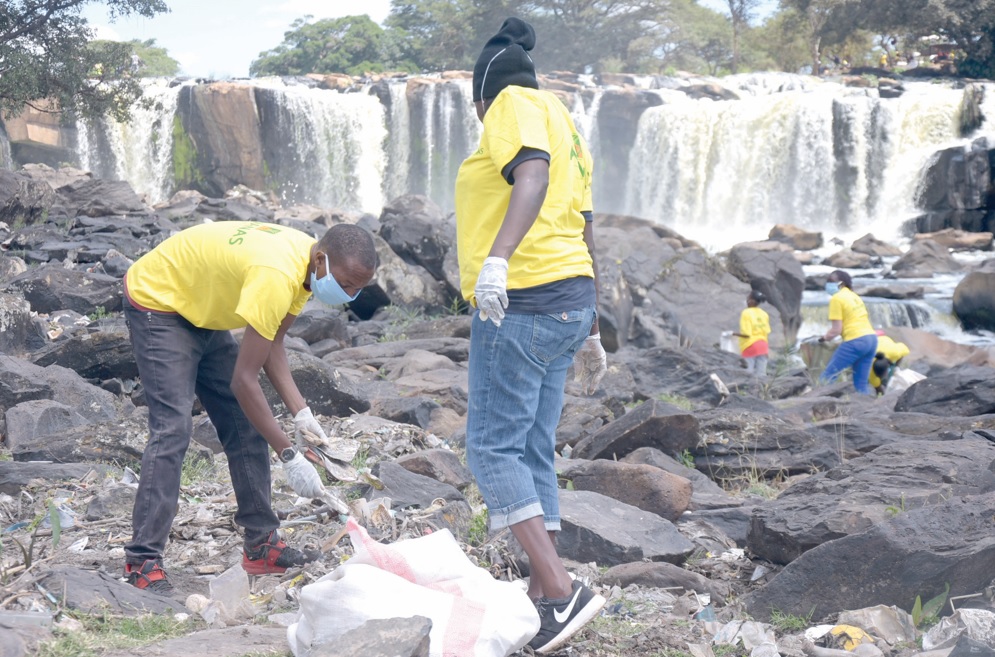Ecologists seek immediate clean-up of filthy Athi River
By Mathew.Ndungu, June 8, 2023Environmentalists are now calling for urgent clean-up of the heavily polluted Athi River that snakes from the iconic Ngong Hills in Nairobi, flows past the bustling metropolis and through Kenya’s largest national park, Tsavo East, all the way to the Indian Ocean.
Currently, trash and garbage have been washing down the huge river causing pollution of the water that forms the popular 14 falls, a spectacular phenomenon in Thika which happens to be the main tourist attraction site in Kiambu County.
The once eye-catching tourist destination is drastically losing its glory thanks to pollution of Athi River whose washed-down filth continues to form a gagging green smear of stinking substances in the name of water.
The famous white frothy foams that tourists, both local and international, used to chase to touch are no longer healthy as the water at the fall and in the river is reportedly mixed with sewage that flows all the way from Nairobi’s informal settlements.
Irregular dumping
The sorry state of Athi River and continuous eroding of 14 falls has been blamed to irregular dumping of waste in Nairobi and poor water and sewage infrastructure.
The situation in Nairobi leads to grave challenges that intensify environmental degradation, pollution, deprived sanitation whose result is the contamination of water sources including Athi River that also serves Thwake multi-purpose dam
According to John Muoki Mutua, a tour guide who ekes a living at 14 falls, the iconic site has been covered with all manner of dirt including plastic materials, polythene bags, hospital syringes, sanitary wares, sex protective gears, bottles among other items that has turned the wonder into a dumping site.
“When we were young, we used to catch fish here, swim and do all manner of exploration along this area. That has since changed as the river and 14 falls at large have been turned into a dumping site by Nairobi city dwellers, dirt that is washed by waters through Athi river to this place,” explained Muoki.
As a result of the filth, Muoki regretted that tourists who used to flock the site have continually reduced and unless urgent interventions are made, the marvel’s existence will only remain as history.
Peter Mwaura Karuga, the Thika Sub-County officer in charge of environment narrated the dreadful nature of the spectacle describing the waters therein as a health hazard to both humans and wildlife.
Mwaura said that while Kiambu County government has been doing clean-ups along the river thrice a year, heaps of dirt continue to pile up along the rocky areas of 14 falls as city dwellers persist in their poor waste disposal.
“New visitors may think the place is neglected but we periodically do clean-ups. The challenge is that when it rains, more dirt is washed down to this place making it unattractive as it was in the yesteryears,” said Mwaura.
Speaking when Ananas Mall management in collaboration with local youths, Kenya Wildlife Service (KWS) and Kiambu County environment officers conducted a clean-up exercise along 14 falls, Mwaura told journalists that talks between Kiambu, Nairobi and Machakos governors are in high gear to clean up the river whose water can be used for domestic consumption and irrigation.
Industrial investors
On her part, Emily Gachegu, the Ananas Mall manager in Thika regretted that the river has been used by industrial investors to discharge dangerous effluents which have stained the sensation thereby scaring away tourists.
Gachegu noted the need to return the original glory of the river by cleaning it up and beautifying its surroundings to attract tourists.
“This to me is the 8th wonder of the world but its current state is disgusting. We need to join hands to help restore the glory of 14 falls and Athi river at large. As Ananas Mall, we cannot sit and watch what God gave us freely going into waste,” said Gachegu.
She urged governors Johnson Sakaja, Kimani Wamatangi and Wavinya Ndeti of Nairobi, Kiambu and Machakos respectively to expedite clean-up of the river and expedite formation of regulations that stipulates stiff punishments for those found dirtying the river.
